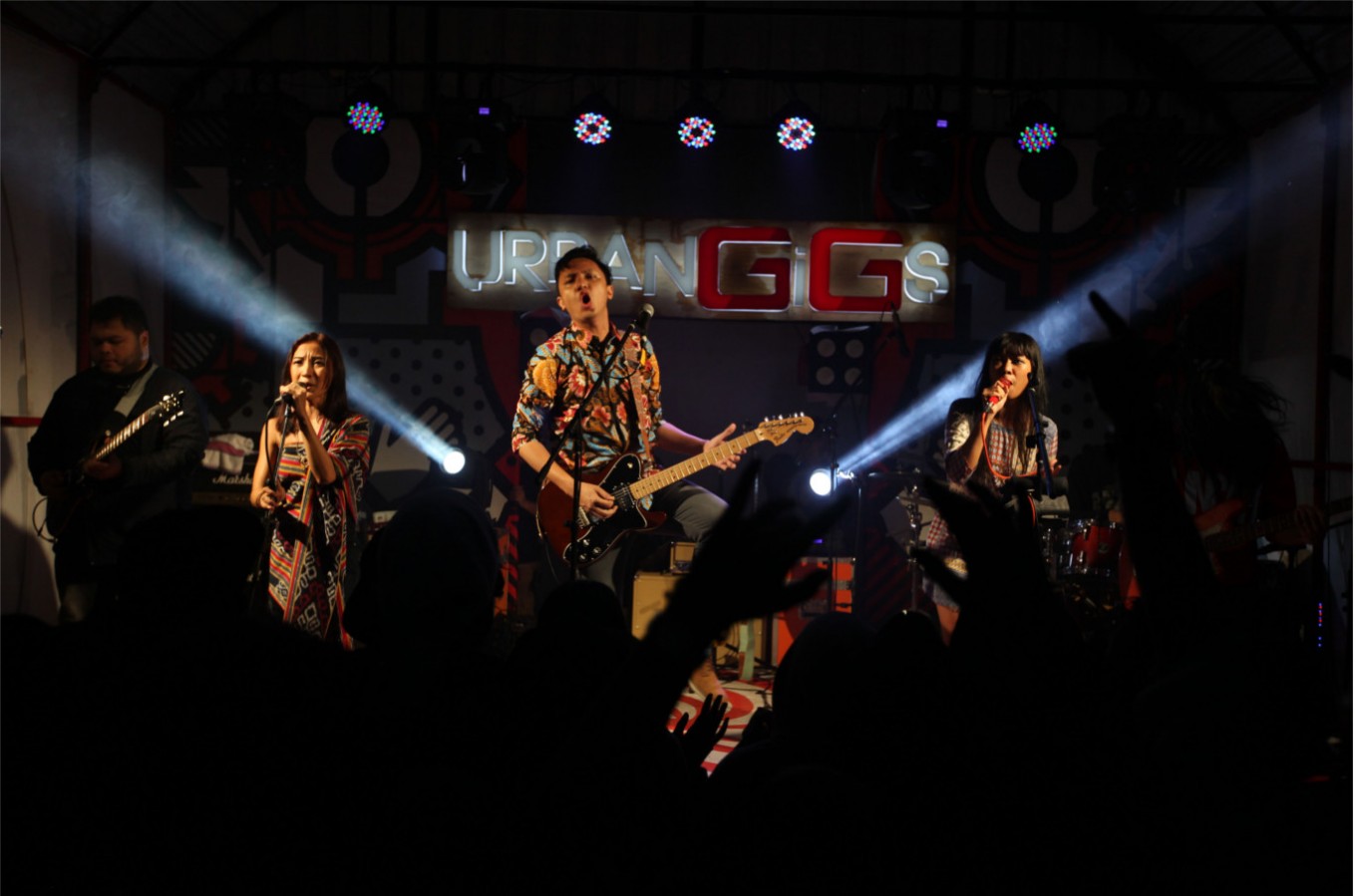Popular Reads
Top Results
Can't find what you're looking for?
View all search resultsPopular Reads
Top Results
Can't find what you're looking for?
View all search resultsThe flaming spirit of Barasuara
Rock band Barasuara fires up exuberant crowds in almost every one of their live performances.
Change text size
Gift Premium Articles
to Anyone
A
rmed with their strong rhythm and distinctive, formal Indonesian language lyrics, the sixpiece band Barasuara swiftly soared into the country’s music scene. It was perhaps a distinct achievement that Barasuara had stolen the music scene’s attention way before releasing their debut album.
The band first gained prominence in 2015 with its homophone-filled single, “Bahas Bahasa” (Talking about Language), and later on, they released the album Taifun (Typhoon) before embarking on a successful tour in six cities across Java.
The band swiftly rose to become one of brightest newcomers in the country’s music scene.
“It’s been a while since I listened to an Indonesian band this good,” jazz pianist Indra Lesmana tweeted about Barasuara. “Their album is super cool!”
Veteran guitarist Abdee Negara of rock band Slank lauded Barasuara as “Cool and bold! Reminds me of King Crimson.”
(Read also: Album review: 'Brønshøj' by Senyawa)
The man behind the band’s success is Iga Massardi, the frontman and guitarist who always dons a batik shirt in every one of Barasuara’s performances.
Iga is perhaps better known as the guitarist who has worked with notable bands like Tika and the Dissidents, The Trees and the Wild and Soulvibe.
Barasuara started out as Iga’s personal project in 2012, but he later decided to invite guitarist TJ Kusuma and drummer Marco Steffiano into the band.
“We did it without setting any great expectation or plan. We only focused on making music and practicing day after day. We did that for almost three years before [we] began performing,” Iga said.
With five original songs in hand, they made their debut performance with Gerald Situmorang on the bass and Asterika Widiantini and Puti Chitara on vocals.
“Barasuara is like the Avengers. Each of them are the best in their fields,” said songstress Raisa, who was the executive producer of the band’s debut album.
Just like Iga, many of Barasuara’s members have learned from years of experience in the music industry.
Marco is the music director of Raisa, while Gerald has built his reputation as a jazz guitarist who has shared the stage with heavyweights such as Tohpati, Erwin Gutawa, Indra Lesmana, Riza Arshad and Aksan Sjuman.
Gerald, Asteriska and Puti have just released their respective solo albums.After having gained enough experience in their respective fields, the band members made some bold adjustments and explorations in Barasuara.
(Read also: Lightcraft to rock Malaysian fest)
Barasuara marked the lead vocal debut of Iga, who once mocked the quality of his own singing voice.
It is through Barasuara that Marco can share his loud drum beats, breaking away from the pop and RnB tunes that he created as a music director for Raisa.
TJ was deep into the ska scene before joining Barasuara.
“I have played ska since middle school. I listened to Red Hot Chili Peppers and Spin Doctors too,” he said. “When I first listened to Iga’s song, ‘Nyala Suara’ [Flaming Sound], my mind instantly imagined the musical arrangement for the song.”
The most drastic change was perhaps made by Gerald, who swapped his jazz guitar with a rocker bass guitar.
“Aside from jazz, I love listening to rock, especially Japanese rock,” Gerald said. “I never imagined that I would play bass guitar. It resembles a guitar but it is still different. When I first tried playing bass for Barasuara, it felt weird but the bandmates said that my bass-playing style suited the band.”
Barasuara stands out with its strong percussive side — which may remind some of ethnic music — and formal Indonesian language lyrics. Iga played with puns, rhymes and sometimes unfamiliar terms to create the lyrics.
Some may call the lyrics poetic, others may find them gibberish. In any case, the band’s fans still enjoy chanting the songs whether or not they understand the meanings behind the lyrics.
“What does ‘Samara, Ani, Jiyana’ mean?” a curious fan asked Gerald on his ask.fm page.
The fan was referring to a line from Barasuara’s latest single, “Samara”, in which Iga used a collection of metaphors revolving around dusk and fading light to speak about good people who remain silent in the wake of the growing number of vigilantes in the country.
“We’re not living in the repressive era anymore. So don’t be afraid to speak the truth and speak up for the sake of the people,” Iga said. “Because we meet many people who bring violence under the name of religion or else. Such bad people exist because the good people keep silent.”
There is no bold nationalistic agenda behind Iga’s decision to wear batik and write formal Indonesian lyrics. The batik shirt is a habit that was unintentionally formed since his first performance with Barasuara. He uses Indonesian words because it feels “more straightforward”.
“I don’t read highbrow literature. People are often surprised to learn that I only read guitar magazines. But perhaps one thing that affects my writing style is my father,” Iga said, referring to novelist and poet Yudhistira ANM Massardi.
While noting that he is “not the kind of person who reads my father’s books”, Iga said that his father introduced him to the world of literature at an early age.
(Read also: Bonnie Triyana: Learning about today's society from history)
“He introduced me to poetry reading events. He and [singer] Frankie Sahilatua used to write lyrics or read poems together at my house.” Poems are found everywhere at his house. “Even in the bathroom, I can read a poem from my father dedicated to my mother. It is literally plastered on the bathroom wall!”
One evening in Bulungan, South Jakarta, the band played to a packed audience.
Looking sleek in his batik shirt, Iga started strumming his guitar and singing, leading his band and the audience to sing along to their anthems.
“Iga has gotten better now,” said Asterika, halfjokingly evaluating the frontman’s performance. “He used to concentrate on the guitar only but now he can share his focus between the singing and the guitar.”
Behind the drum set, Marco gave his fullest energy to produce strong rhythms, and perhaps do things that he may not have done while performing with Raisa.
“I love working with Raisa,” Marco underlined. “But when I am with Barasuara, I can flip, open my clothes or throw the drums. I can explore something beyond the music I usually perform with Raisa.”
“I can paint something different with Barasuara,” he added.
The band and the audience began to create an immense amount of energy, becoming one big choir, and their energy got even stronger when they repeated the refrains of the songs behind the even-louder drumbeats and guitar rhythms.
Perhaps for that energy that they created with the audience, Barasuara was awarded Best Live Act at the 2016 Rolling Stone Editors’ Choice Awards.
“We received letters from some Penunggang Badai [Storm Riders],” TJ said, referring to Barasuara fans.
“They said listening to Barasuara’s music has helped them to rediscover the flames in themselves, even finding a bigger flame. That inspired us to ignite more flames through our music,” he said.











